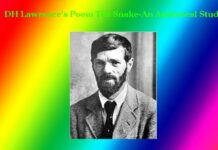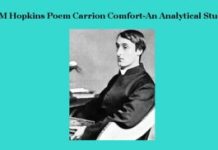The Theme of Love in the Poetry of Emily Dickinson
The Theme of Love in the Poetry of Emily Dickinson
The Theme of Love in the Poetry of Emily Dickinson
Miss Emily Dickinson (1830-1886) was a great poetess of America. She wrote poems on a variety of themes among which the theme of love plays a salient role in his poetry. She had written a large number of poems on this theme through which she expresses her private love affairs with several persons. But her love poems are full of ambiguity, obscurity and puzzling to comprehend easily. To understand her love poems we must turn to her private life— because her poems are the reflection of her own life— her thoughts, feeling, sentiments, whims and philosophy which are something wayward. Miss Emily Dickinson had never been married and led a virgin life. But though she remained unmarried throughout her life yet she went into contact of some distinguished male friends. With whom, it is believed, she had fallen in love. Amongst them, one was Helen Haunt Jackson who achieved fame by writing a book entitled Romana. He remained a friend to her for some years and inspired her to pursue the writing of poetry. Secondly, she went into the touch of another literary man by the name of Mr. Benjamin Newton. He tried to guide her in the field of poetry reading and writing. An intimacy developed between them and Miss Emily took him to be her would-be lover or a life partner. But one day in 1853, while Miss Emily was twenty-three years old, he died suddenly. The death of Benjamin Newton gave her a shock. A year later, she travelled to Philadelphia where she met a married clergyman by the name of Charles Wordsworth. She respected him much and took him as her lover and exchanged several letters with him. But eventually, in 1860 Charles Wordsworth cut off communication with her. Then she chose a life of seclusion and had been keeping herself most at home. In 1878 she met another gentleman by the name of Otis P. Lord. He was a judge of the supreme court of Massachusetts—a distinguished and casually attractive man. He was one of her father’s best friends and much senior to her. She had written about a dozen letters to him which proved that she was emotionally in deep love with him. But neither to him nor to the former friends had she revealed her love deliberately. Perhaps the cause of her secrecy in expressing her desire of love to them was that all those persons were distinguished and well-established for which she, thinking herself to be a worthless simple girl, hesitated to express her deep love to them. But throughout her life, she had kept their images warm in her mind and in her poems she often made references to them. But her love as expressed in her poems is less and less physical and more and more spiritual. She thought that physical love begot pain, sufferance and despair. It is only spiritual love that inspires a heart to live. As she was rejected by her friends so she became desperate in worldly or physical love and wished to unite with them spiritually and this thought kept her heart warm. As her love is spiritual, she wished to be united with her lovers in heaven so her love poems have become ambiguous—because, after death, she imagined to get united with her lover. But who was her loved person? Sometimes God or Christ stands as her lover who would give her shelter in heaven amid joy, peace and happiness and sometimes she refers to her earthly friends whom she had lost. A critical study of her major love poems clarifies something of the mystery.
The poetess Emily Dickinson was, as a lover, an extraordinary one. She loved her loved person very deeply. In the poem, My Life Had Stood—A Loaded Gun she wrote that one day her lover took her to a secluded wood where they enjoyed hunting pleasure and slept with her. She says:
‘And when at night—our good day done—
I guard my master’s head—’
Again in the same poem, she continues to tell that she is a deadly foe to the foe of her loved person and it proves how deeply she was in love with her lover. To say in the poetess’ words:
‘To foe of his—I’m deadly foe—
None stir the second time.’
In another poem entitled ‘My Life Closed Twice Before it Close’ — she makes a reference to her two lovers—perhaps Newton and Wordsworth—who had left her and gave her a shock. She became desperate but she did not lose hope. Though the loss of her two friends fell a deadly shock on her heart yet she wished that she would meet her desired lover after death. In her own words:
‘My life closed twice before its close—
It yet remains to see
If Immortal— unveil
A third event to me.’
‘Just Lost When I was Saved ‘is a poem that may be interpreted in the light of her private love life. In this poem, she refers to Benjamin Newton with whom she fell in love. He died while Emily was twenty-third years old. His death gave her a shock and broke her heart, but later on, she had fallen in love with Wordsworth and reawakened her heart but eventually, he also rejected her — the rejection of whom gave a blow to her heart. In the poem she says:
‘Just lost, when I was saved!
Just felt the world go by!’
Through this poem, the poetess tries to exhibit that worldly love or desire for sexual love begets despair.
The above discussion shows us that Miss Emily Dickinson’s sense of love was first worldly and then it developed into divine feeling through silent sufferance of the pain of separation.
In American literature, Emily Dickinson as a love poetess is a difference because her sense of love is more divine and spiritual compared to other American love poets. 0 0 0
The Theme of Love in the Poetry of Emily Dickinson
Read More: Theme Analysis of ‘Diary of a Country Prosecutor’
The Theme of Love in the Poetry of Emily Dickinson
N. B. This article entitled ‘The Theme of Love in the Poetry of Emily Dickinson’ originally belongs to the book ‘Emily Dickinson’s Poetry: A Thematic Study‘ by Menonim Menonimus. The Theme of Love in the Poetry of Emily Dickinson
Books of Literary Criticism by M. Menonimus:
- World Short Story Criticism
- World Poetry Criticism
- World Drama Criticism
- World Novel Criticism
- World Essay Criticism
- Indian English Poetry Criticism
- Indian English Poets and Poetry Chief Features
- Emily Dickinson’s Poetry-A Thematic Study
- Walt Whitman’s Poetry-A Thematic Study
- Critical Essays on English Poetry
- Tawfiq al-Hakim’s Novel: Return of the Spirit-An Analytical Study
- Tawfiq al-Hakim’s Novel: ‘Yawmiyyat Naib Fil Arayaf’-An Analytical Study
- Analytical Studies of Some Arabic Short Stories
- A Brief History of Arabic Literature: Pre-Islamic Period …
Related Searches:











